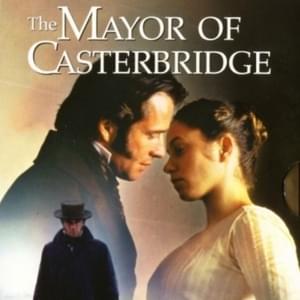
The Mayor of Casterbridge (Chap. 8) Thomas Hardy
На этой странице вы найдете полный текст песни "The Mayor of Casterbridge (Chap. 8)" от Thomas Hardy. Lyrxo предлагает вам самый полный и точный текст этой композиции без лишних отвлекающих факторов. Узнайте все куплеты и припев, чтобы лучше понять любимую песню и насладиться ею в полной мере. Идеально для фанатов и всех, кто ценит качественную музыку.

Thus they parted; and Elizabeth-Jane and her mother remained each in her thoughts over their meal, the mother's face being strangely bright since Henchard's avowal of shame for a past action. The quivering of the partition to its core presently denoted that Donald Farfrae had again rung his bell, no doubt to have his supper removed; for humming a tune, and walking up and down, he seemed to be attracted by the lively bursts of conversation and melody from the general company below. He sauntered out upon the landing, and descended the staircase.
When Elizabeth-Jane had carried down his supper tray, and also that used by her mother and herself, she found the bustle of serving to be at its height below, as it always was at this hour. The young woman shrank from having anything to do with the ground-floor serving, and crept silently about observing the scene—so new to her, fresh from the seclusion of a seaside cottage. In the general sitting-room, which was large, she remarked the two or three dozen strong-backed chairs that stood round against the wall, each fitted with its genial occupant; the sanded floor; the black settle which, projecting endwise from the wall within the door, permitted Elizabeth to be a spectator of all that went on without herself being particularly seen.
The young Scotchman had just joined the guests. These, in addition to the respectable master-tradesmen occupying the seats of privileges in the bow-window and its neighbourhood, included an inferior set at the unlighted end, whose seats were mere benches against the wall, and who drank from cups instead of from glasses. Among the latter she noticed some of those personages who had stood outside the windows of the King's Arms.
Behind their backs was a small window, with a wheel ventilator in one of the panes, which would suddenly start off spinning with a jingling sound, as suddenly stop, and as suddenly start again.
While thus furtively making her survey the opening words of a song greeted her ears from the front of the settle, in a melody and accent of peculiar charm. There had been some singing before she came down; and now the Scotchman had made himself so soon at home that, at the request of some of the master-tradesmen, he, too, was favouring the room with a ditty.
Elizabeth-Jane was fond of music; she could not help pausing to listen; and the longer she listened the more she was enraptured. She had never heard any singing like this and it was evident that the majority of the audience had not heard such frequently, for they were attentive to a much greater degree than usual. They neither whispered, nor drank, nor dipped their pipe-stems in their ale to moisten them, nor pushed the mug to their neighbours. The singer himself grew emotional, till she could imagine a tear in his eye as the words went on:—
“It's hame, and it's hame, hame fain would I be,
O hame, hame, hame to my ain countree!
There's an eye that ever weeps, and a fair face will be fain,
As I pass through Annan Water with my bonnie bands again;
When the flower is in the bud, and the leaf upon the tree,
The lark shall sing me hame to my ain countree!”
There was a burst of applause, and a deep silence which was even more eloquent than the applause. It was of such a kind that the snapping of a pipe-stem too long for him by old Solomon Longways, who was one of those gathered at the shady end of the room, seemed a harsh and irreverent act. Then the ventilator in the window-pane spasmodically started off for a new spin, and the pathos of Donald's song was temporarily effaced.
“'Twas not amiss—not at all amiss!” muttered Christopher Coney, who was also present. And removing his pipe a finger's breadth from his lips, he said aloud, “Draw on with the next verse, young gentleman, please.”
“Yes. Let's have it again, stranger,” said the glazier, a stout, bucket-headed man, with a white apron rolled up round his waist. “Folks don't lift up their hearts like that in this part of the world.” And turning aside, he said in undertones, “Who is the young man?—Scotch, d'ye say?”
“Yes, straight from the mountains of Scotland, I believe,” replied Coney.
Комментарии (0)
Минимальная длина комментария — 50 символов.












